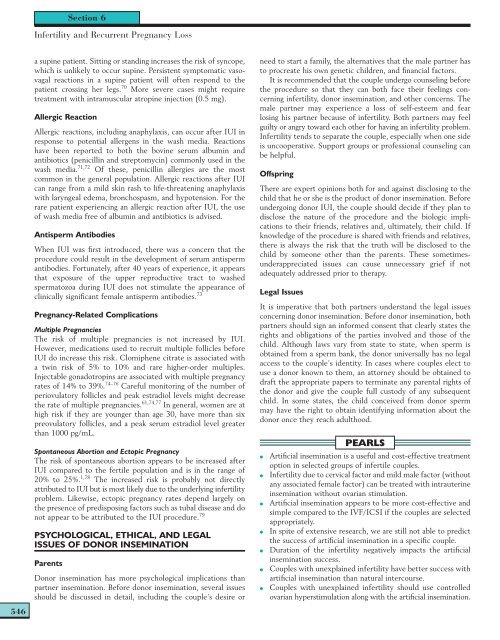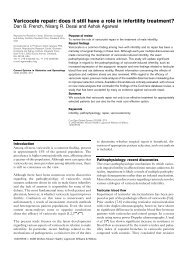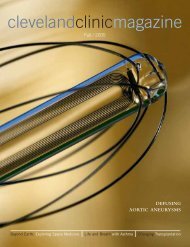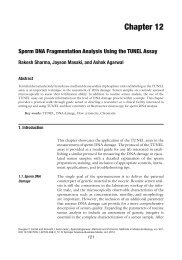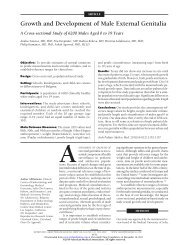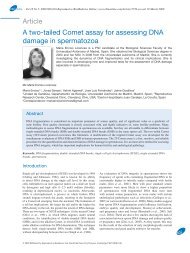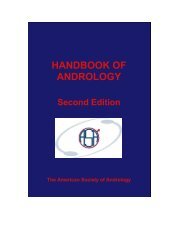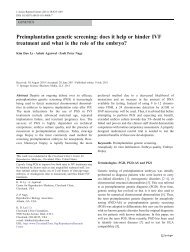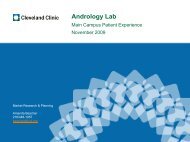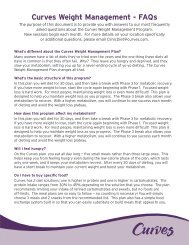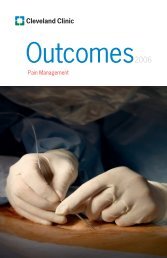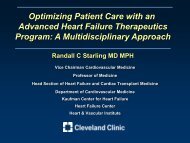Artificial Insemination
Artificial Insemination
Artificial Insemination
You also want an ePaper? Increase the reach of your titles
YUMPU automatically turns print PDFs into web optimized ePapers that Google loves.
Ch36-A03309.qxd 1/23/07 5:16 PM Page 546<br />
Section 6<br />
Infertility and Recurrent Pregnancy Loss<br />
546<br />
a supine patient. Sitting or standing increases the risk of syncope,<br />
which is unlikely to occur supine. Persistent symptomatic vasovagal<br />
reactions in a supine patient will often respond to the<br />
patient crossing her legs. 70 More severe cases might require<br />
treatment with intramuscular atropine injection (0.5 mg).<br />
Allergic Reaction<br />
Allergic reactions, including anaphylaxis, can occur after IUI in<br />
response to potential allergens in the wash media. Reactions<br />
have been reported to both the bovine serum albumin and<br />
antibiotics (penicillin and streptomycin) commonly used in the<br />
wash media. 71,72 Of these, penicillin allergies are the most<br />
common in the general population. Allergic reactions after IUI<br />
can range from a mild skin rash to life-threatening anaphylaxis<br />
with laryngeal edema, bronchospasm, and hypotension. For the<br />
rare patient experiencing an allergic reaction after IUI, the use<br />
of wash media free of albumin and antibiotics is advised.<br />
Antisperm Antibodies<br />
When IUI was first introduced, there was a concern that the<br />
procedure could result in the development of serum antisperm<br />
antibodies. Fortunately, after 40 years of experience, it appears<br />
that exposure of the upper reproductive tract to washed<br />
spermatozoa during IUI does not stimulate the appearance of<br />
clinically significant female antisperm antibodies. 73<br />
Pregnancy-Related Complications<br />
Multiple Pregnancies<br />
The risk of multiple pregnancies is not increased by IUI.<br />
However, medications used to recruit multiple follicles before<br />
IUI do increase this risk. Clomiphene citrate is associated with<br />
a twin risk of 5% to 10% and rare higher-order multiples.<br />
Injectable gonadotropins are associated with multiple pregnancy<br />
rates of 14% to 39%. 74–76 Careful monitoring of the number of<br />
periovulatory follicles and peak estradiol levels might decrease<br />
the rate of multiple pregnancies. 61,74,77 In general, women are at<br />
high risk if they are younger than age 30, have more than six<br />
preovulatory follicles, and a peak serum estradiol level greater<br />
than 1000 pg/mL.<br />
Spontaneous Abortion and Ectopic Pregnancy<br />
The risk of spontaneous abortion appears to be increased after<br />
IUI compared to the fertile population and is in the range of<br />
20% to 25%. 1,78 The increased risk is probably not directly<br />
attributed to IUI but is most likely due to the underlying infertility<br />
problem. Likewise, ectopic pregnancy rates depend largely on<br />
the presence of predisposing factors such as tubal disease and do<br />
not appear to be attributed to the IUI procedure. 79<br />
PSYCHOLOGICAL, ETHICAL, AND LEGAL<br />
ISSUES OF DONOR INSEMINATION<br />
Parents<br />
Donor insemination has more psychological implications than<br />
partner insemination. Before donor insemination, several issues<br />
should be discussed in detail, including the couple’s desire or<br />
need to start a family, the alternatives that the male partner has<br />
to procreate his own genetic children, and financial factors.<br />
It is recommended that the couple undergo counseling before<br />
the procedure so that they can both face their feelings concerning<br />
infertility, donor insemination, and other concerns. The<br />
male partner may experience a loss of self-esteem and fear<br />
losing his partner because of infertility. Both partners may feel<br />
guilty or angry toward each other for having an infertility problem.<br />
Infertility tends to separate the couple, especially when one side<br />
is uncooperative. Support groups or professional counseling can<br />
be helpful.<br />
Offspring<br />
There are expert opinions both for and against disclosing to the<br />
child that he or she is the product of donor insemination. Before<br />
undergoing donor IUI, the couple should decide if they plan to<br />
disclose the nature of the procedure and the biologic implications<br />
to their friends, relatives and, ultimately, their child. If<br />
knowledge of the procedure is shared with friends and relatives,<br />
there is always the risk that the truth will be disclosed to the<br />
child by someone other than the parents. These sometimesunderappreciated<br />
issues can cause unnecessary grief if not<br />
adequately addressed prior to therapy.<br />
Legal Issues<br />
It is imperative that both partners understand the legal issues<br />
concerning donor insemination. Before donor insemination, both<br />
partners should sign an informed consent that clearly states the<br />
rights and obligations of the parties involved and those of the<br />
child. Although laws vary from state to state, when sperm is<br />
obtained from a sperm bank, the donor universally has no legal<br />
access to the couple’s identity. In cases where couples elect to<br />
use a donor known to them, an attorney should be obtained to<br />
draft the appropriate papers to terminate any parental rights of<br />
the donor and give the couple full custody of any subsequent<br />
child. In some states, the child conceived from donor sperm<br />
may have the right to obtain identifying information about the<br />
donor once they reach adulthood.<br />
●<br />
●<br />
●<br />
●<br />
●<br />
●<br />
●<br />
PEARLS<br />
<strong>Artificial</strong> insemination is a useful and cost-effective treatment<br />
option in selected groups of infertile couples.<br />
Infertility due to cervical factor and mild male factor (without<br />
any associated female factor) can be treated with intrauterine<br />
insemination without ovarian stimulation.<br />
<strong>Artificial</strong> insemination appears to be more cost-effective and<br />
simple compared to the IVF/ICSI if the couples are selected<br />
appropriately.<br />
In spite of extensive research, we are still not able to predict<br />
the success of artificial insemination in a specific couple.<br />
Duration of the infertility negatively impacts the artificial<br />
insemination success.<br />
Couples with unexplained infertility have better success with<br />
artificial insemination than natural intercourse.<br />
Couples with unexplained infertility should use controlled<br />
ovarian hyperstimulation along with the artificial insemination.


